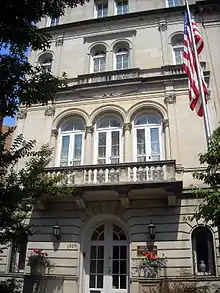The Fund for American Studies
The Fund for American Studies is a non-profit organization based in Washington, D.C. Founded in 1967, the organization's mission is "to change the world by developing leaders for a free society."[1]
| Established | 1967 |
|---|---|
| President | Roger Ream |
| Chairman | Randal C. Teague |
| Address | 1706 New Hampshire Ave., NW Washington, D.C. 20009 |
| Location | |
| Coordinates | 38.9130°N 77.0408°W |
| Website | tfas |
History

In 1967, Charles Edison took the first steps toward establishing the institution that is known today as The Fund for American Studies. Edison was a former governor of New Jersey, Secretary of the Navy, and son of inventor Thomas Alva Edison.[2]
Concerned about an eroding confidence in the American system of government, Edison recruited Walter H. Judd, David R. Jones, Marvin Liebman, and William F. Buckley Jr. to build a program that would educate college students about American government, politics, and economics.[3]
On February 6, 1967, the group incorporated the Charles Edison Youth Fund. In 1969, Edison died suddenly. To honor him and carry on his mission, the organization was renamed the Charles Edison Memorial Youth Fund. In 1985, the organization was renamed again to its present-day title, The Fund for American Studies. In the summer of 1970, the Edison Fund organized the inaugural Institute on Comparative Political and Economic Systems. Fifty-seven students attended the first Institute.[4]
References
- "About". The Fund for American Studies. Retrieved 28 February 2019.
- Snively, Ian (September 27, 2017). "Fund for American Studies, Invented by a Son of Edison, Celebrates 50 Years". Daily Signal. Retrieved 28 February 2019.
- Frohnen, Bruce; Beer, Jeremy; Jeffrey, Nelson (2014). American Conservatism: An Encyclopedia. Open Road Media. ISBN 9781497651579.
- Messer-Davidow, Ellen (2002). Disciplining Feminism: From Social Activism to Academic Discourse. Duke University Press. p. 239. ISBN 9780822383581.
